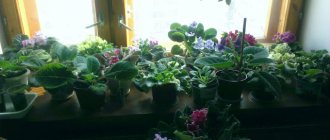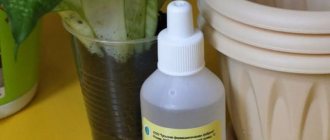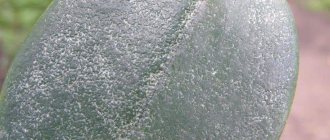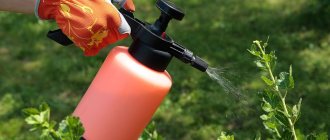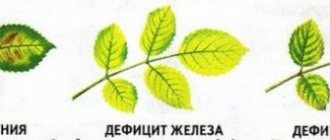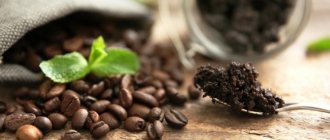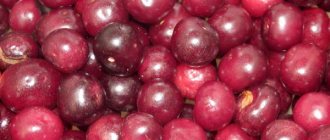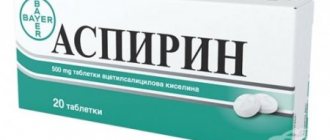It turns out that not only people, but also many indoor plants are not averse to “drinking a glass” in difficult life situations. At the same time, they are not threatened by alcoholism; on the contrary, they will become stronger and healthier.
Indoor plants on the veranda
Read on dacha6.ru:
Is it possible to water plants with hot water?
How to propagate ficus
Instructions for using vodka against aphids
Any vodka, alcohol or moonshine is suitable for spraying plants. You can use the “heads” of moonshine (the upper fraction), which still cannot be distilled again.
Treatment of garden plants should be carried out in the evening, at sunset, when insects become inactive. In bright sunlight, there is a high chance that plant leaves will get burned.
When spraying, you need to try to ensure that the liquid wets the leaves both above and below: pests often hide on the underside of the leaf blade. The water for preparing the solution should be warm (+25–27 °C).
Laundry or special green soap (sold in gardening stores) must be added to the spraying solution at the rate of 20 g of crushed soap per 1 liter of liquid. Soap shavings are first dissolved in a small amount of warm water and then mixed with the rest of the liquid.
Soap has a triple function:
- serves as an adhesive;
- compacts the leaves, making them “waxy”, which is why the pest cannot pierce them;
- clogs the breathing holes of aphids.
Wild plants are also not averse to having a glass.
Indoor flowers have a much easier life than their wild-growing counterparts. After all, a person provides his pet with everything necessary. What about plants that grow on their own?
An unusual incident occurred at Oxford University. An ordinary decorative ivy, entwining the walls of an educational institution, sprouted one of its stems into the constantly ajar window of the semi-basement floor. A wine barrel got in the way of the determined plant. After some time, the entire fortified drink was “drunk” by the ivy. It is worth noting that the wine did not cause any harm to the plant. On the contrary, the flower began to look much healthier than its not-so-lucky counterparts.
As we can see, alcohol is useful not only for indoor flowers. So don’t be afraid to treat your garden plants to strong drinks as well.
Found a violation? Report content
Acceleration of maturation
A study of the effect of ethanol on the ripening of tomatoes was carried out back in 1934 by Soviet botanists S.V. Soldatenkov and M.G. Kubli. During the experiment, alcohol solution in various concentrations was injected into unripe fruits during their growth and the results were observed.
As a result, scientists were able to speed up the process by 8-16 days, and the processed tomatoes tasted no different from regular ones. Subsequently, M. G. Kubli continued his experiments and two years later even published a fundamental work on this topic, but the experiments did not receive practical application.
Accelerated ripening after spraying with alcohol-containing solutions is explained by the fact that ethanol, under the influence of enzymes, releases ethylene, a powerful growth stimulant. This volatile gas in low concentrations activates the formation of the root system, promotes flowering, and accelerates the ripening of fruits. In nature, plants synthesize ethylene naturally, and scientists classify it as one of the types of phytohormones.
Vodka - food for fresh cut flowers
Cut flowers lose their original freshness due to the absence of a root, from which the plant receives nutritious moisture. Another reason for wilting is the proliferation of bacteria. A few drops of vodka and a piece of sugar will help prevent the spread of pests and provide the flowers with the necessary nutrition: they must be added to the water with the flowers. It is necessary to change the water every day, the alcohol evaporates quickly, and the sugar is absorbed by the stems.
Trim stems frequently
You may have seen seals on the stems of cut flowers bought at a flower shop. This way the stem covers the damage so that no harmful bacteria damage the internal structure of the plant.
Unfortunately, these seals prevent the stem from absorbing water and essential nutrients. And without water, freshly cut flowers will die very quickly.
To combat this phenomenon, you should always trim the stems of purchased flowers.
This should be done at an angle of 45 degrees to increase the cutting area and allow the plant to absorb more water. The stems need to be trimmed every few days. This also applies to those flowers that you picked in your own garden.
Which indoor flowers can be watered with vodka and how to water them correctly
These types of house plants can be watered with a vodka solution:
- Asparagus: grows and develops quickly if you water it with a weak vodka solution once every two weeks (1-2 tbsp per 1 liter of water).
- Monstera: prefers a weaker solution (1-2 tbsp per 2 liters of water). The frequency of applying fertilizer is 1-2 times a month.
- Ficus benjamina: often begins to lose leaves for no reason. In fact, he needs alcohol supplementation. Dilute 1 tbsp. l. for 250 ml of water. Such procedures are carried out once every 2 weeks. After four feedings, the plant comes to life and grows abundantly with new leaves.
- Some varieties of cacti and palm trees: prefer an alcoholic drink in a ratio of 1 tbsp. l. for 1 liter of water. Water once a month.
- Violets: when powdery mildew appears on them, it is necessary to spray them with vodka water, the disease will not spread throughout the plant. In 5-6 sprayings with an interval of 4-5 days, the plant takes on its previous appearance. This should be done at the very beginning of the disease (1 tbsp per 200 ml of water).
- Regular ivy: a climbing plant that climbs walls and stairs, does not mind this fertilizer. Its growth increases, the leaves acquire a juicy color and thickness. It is enough to feed once a week (2 tablespoons per 3 liters of water).
Houseplants that are very sick from pest attacks are treated with a solution of vodka and laundry soap in a one-to-one ratio. The composition is sprayed onto the foliage, left for 30 minutes, and washed off. Perform from two to four treatments. After such care, the plant recovers.
All gardeners want their favorites to have bright and juicy foliage. To do this, spray with a solution of camphor alcohol: 2-4 drops per liter of water.
Help: flowers are fed, not overfed. If there is an excess of fertilizer, growth processes are disrupted and the flower may die.
Alcohol flower feeding is used like everyone else, following the rules:
- apply fertilizer from early April to mid-October;
- in winter, their number is gradually reduced, reduced to a minimum;
- They begin to feed when the plant withers and feels a lack of nutrients;
- use fertilizer if the plant’s growth has stopped or it has not bloomed for a long time;
- feed when the flower drops its leaves for no reason or looks sick.
Important: you cannot apply fertilizing to dry soil, as you can burn the roots of the plant.
Caring for indoor flowers is not an easy and troublesome task. True lovers of this hobby will always find the right approach using different fertilizers. Today flower growers got acquainted with another equally important and original one.
Flower processing
Most often, indoor and garden flowers are treated with vodka. Ethanol stimulates photosynthesis, promotes early flowering, disinfects the soil and fights root rot. The method does not work effectively for all types of plants.
Proven methods:
- for rapid growth, asparagus is watered once every 14 days with a solution at the rate of 12 ml of vodka (2 tbsp) per 1 liter of water;
- violets - spraying with a mixture of 6 ml of vodka per glass of water helps cure powdery mildew;
- palm trees - watering once a month with a glass of water with 1 tbsp. l. vodka heals the plant;
- ficus - if leaves are lost, wipe with a solution of vodka (1 tbsp per 250 ml of water), treatment is carried out once every two weeks.
Watering roses with vodka is an easy way to awaken bushes from hibernation and achieve early flowering. Alcohol cannot be used in its pure form - it can burn the leaves. Add one glass of vodka to a bucket of water and water the plants generously. This method is especially effective if the winter has been cold and with insufficient snow.
To protect ornamental shrubs, flowers and berry crops from aphids, foliage and stems are sprayed with a solution of 1 liter of warm water, 100 g of vodka and 20 g of soap shavings. Treatment is carried out in the early morning or late evening, when pests are less active. The leaves are thoroughly moistened on all sides, including secluded corners where insects can hide.
Treatment of seedlings with vodka
Even with proper preparation of the soil for seedlings, there is a risk of infection with fungal diseases, since spores can be introduced with purchased soil. Young tomatoes are most often affected by the black leg at the bottom of the stem. If signs of disease are noticed on one sprout, the entire batch requires urgent treatment.
Procedure:
- Dilute 1 tablespoon of vodka in 1 liter of warm water.
- Water the seedlings at the root once.
The method prevents the development of the disease and serves as an additional impetus for growth and strengthening of the immune system. To protect the seedlings already at the stage of emergence on the surface, they are sprayed with moonshine or vodka diluted with water in a ratio of one to ten. The method is effective for seedlings of cabbage, asters and nasturtiums.
Remove excess leaves
The stems of cut flowers are often covered in leaves that fill the vase and do not look particularly attractive in water. Therefore they are removed.
We bake a whole basket of “mushrooms”: we take a plastic bottle to help
Just water and a shovel: how white coral, popular in decoration, is mined
Big mistake of believers: what people often do wrong on Parents' Day
However, removing excess leaves is necessary not only for aesthetic purposes. Most gardeners know the standard rules for watering plants: never water from above to prevent water from pooling on the leaves. This prevents the development of bacteria on the plant due to excess moisture. The same rule applies to cut flowers.
When leaves are left in water for a long time, they begin to rot. As a result, dangerous bacteria begin to multiply. In addition, rotting leaves attract insects. This is bad for bouquets and for the house in general. It is very important that the water in the vase is as clean as possible to keep the flowers fresh.
Before placing flowers in the vase, determine where the water line ends. After this, remove all leaves below this point.
Vodka against pests, diseases and weeds
Watering with vodka is used as an unconventional way to combat aphids and the Colorado potato beetle. Ethanol blocks the respiratory tract and causes disruption of the central nervous system of insects. Treated plants acquire an unpleasant odor and become bitter, which forces pests to leave the area. The advantages of the method are its environmental friendliness. Ethyl alcohol, unlike insecticides, is safe for humans and pets.
Vodka for plants serves as an antiseptic and is used to improve soil health and fight fungal diseases. Ethanol kills spores and prevents their spread. Alcohol solutions are also used to control weeds in small areas.
Vodka disinfects the soil
Irrigating the soil with ethyl alcohol stimulates the development of seeds that are in the ground. Subsequent weeding allows you to remove all the weeds at one time, after which the soil remains clean for a long time.
Beneficial properties of ammonia for house plants
Ammonia has properties due to which it is successfully used in floriculture and gardening to fertilize plants. The product is used as a source of nitrogen, the main component of the organelles of indoor plants. They can only absorb it from the soil (in bound form).
Many potted flowers respond well to ammonia as a source of nitrogen: hydrangeas, geraniums, clematis, cyclamen, lilies. It is responsible for the full development of all green parts of plants.
Regardless of the method of use, ammonia has a positive effect on houseplants, this manifests itself in the form of:
- active growth;
- bright green foliage;
- abundant flowering.
In addition to enriching the soil, ammonia also disinfects it, and in some cases even helps get rid of small insects. Among them:
- mole cricket;
- aphid;
- weevil;
- spider mite;
- onion fly.
Many flower growers use ammonia in flower care because of its availability and effectiveness. It is a powerful prophylactic in the fight against certain fungal infections.
Recipes for preparing alcohol-based aphids
Tender young foliage, herbs, and flowers are afraid of burns, while the trunk and branches of trees and shrubs can be treated at any time. Therefore, you will need several options for preparing a solution of different concentrations.
Different concentrations of alcohol are used to treat different plants.
Strong solution
Prepare as follows:
- warm water (25-30 degrees Celsius) – 1 l;
- vodka – 300 ml (it can be replaced with 150 ml of alcohol 96 degrees);
- laundry or green soap – 20 gr.
This concentration is used only for fruit bushes and trees. The trunk and branches are processed with a brush. The spray can be used in the fall or early spring before new leaves appear.
If solid laundry soap is used in the process of preparing the solution, then it must be crushed and first dissolved separately in a small amount of water, and then added to the total mass. The soap allows the solution to remain on the surface of the plant longer. It creates a protective film that makes it difficult for insects to feed and clogs the respiratory tract of pests.
Weak solution
To prepare this aphid remedy you will need:
- warm water (25-30 degrees Celsius) – 1 l;
- vodka – 100 ml (can be replaced with 50 ml of alcohol 96 degrees);
- laundry or green soap – 20 gr.
A lightweight version of the solution can be used to treat any crops.
Coca-Cola solution (weak)
The Coca-Cola drink must first be rid of carbon dioxide. To do this, you can pour it into a wide container or jar and leave it for a day so that the gas evaporates.
Mixing Ingredients:
- Coca-Cola – 1 l;
- vodka – 100 ml (or 50 ml of alcohol 96 degrees);
- laundry or green soap – 20 gr.
The acids contained in Coca-Cola in combination with alcohol have a detrimental effect on aphids. In addition, the sweetness of the drink helps the product stay on the surface of plants longer, which increases the period of its effect on parasites.
Oil solution (weak)
Refined sunflower oil is used to prepare this alcohol solution against aphids. You can’t take unrefined ones, as the strong smell can attract other pests, such as mole crickets.
The solution contains:
- warm water (25-30 degrees Celsius) – 1 l;
- refined sunflower oil – 300 ml;
- vodka – 100 ml (or 50 ml of alcohol 96 degrees);
- laundry or green soap – 20 gr.
The thinnest film formed due to vegetable oil disrupts the respiratory function of insects, and they die.
The spraying procedure with a warm solution should be carried out in the late evening, when the aphids stop actively moving. You need to process greens carefully, paying special attention to the underside of the leaf, where insects most often settle.
Precautionary measures
Use alcohol solutions with extreme caution and only in weak concentrations, since excessive processing can only cause harm. Feed plants if you see signs of disease, poor growth, or wilting.
When watering roses with vodka, start with one bush and if burns appear, increase the amount of water in the solution. Vodka will help in pest control only in case of moderate insect spread. source AlcoFan
Fertilizers for roses are a vital necessity; without fertilizing, rose bushes develop slowly, the buds do not ripen, and do not open to their full potential. Today, garden centers offer us a large selection of fertilizers that promise us good results. Why pay money when we have a lot of products at home that we can use to give strength to the plant and save money at the same time. If you notice that the rose is developing slowly, prepare the following fertilizer for it: take 100 grams of vodka for 3 liters of water, stir and water the rose bush. In just a short period of time, the rose will come to life and begin to grow faster. Vodka will also come to the rescue if your rose is in very bad condition, for example, during a bad winter. To save the rose, prepare a solution for 10 liters of water and take a glass of vodka. By watering just once, the rose bush will come to life, grow and bloom better than last season. Notes from a gardener
How to use alcohol, vodka, moonshine against aphids: concentration
Alcohol is a rather strange substance for controlling aphids. As it turned out, this substance affects the body of insects that absorb alcohol. Due to this, there is a significant effect on the insect’s nervous system, which contributes to impaired coordination of movements and digestion.
How to use alcohol, vodka, moonshine against aphids, concentration:
- It is necessary to dissolve approximately 250 ml of vodka in 1000 milliliters of warm water. Add 20 g of soap shavings. Mix everything and process. This product is ideal for trees and shrubs. This product should not be used to spray vegetable crops such as cucumbers, tomatoes and peppers.
- For vegetable crops, you need to dissolve 100 g of vodka and 20 g of soap in one liter.
- There is another good recipe based on Coca-Cola. Pour about 1000 ml of the product into a jar and leave to stand for about 12 hours so that the carbon dioxide completely evaporates. Pour 100 ml of vodka into the product, add a little soap. The drink contains a large amount of phosphoric acid, which is destructive to aphids.
- Vegetable oil works well with vodka. It is necessary to dissolve approximately 250 ml of oil in one liter of warm water and add 100 g of vodka. Shake the mixture and apply to leaves and stems using a spray bottle. The alcohol itself evaporates very quickly, so the main task is to promote the adhesion of the alcohol to the leaves. It is for these purposes that vegetable oil or soap is added to the mixture. They create a thin film on the surface of the leaves, which does not allow insects to penetrate inside the plant, sucking out its juices. Alcohol drives away insects due to its strong odor and affects the nervous system.
Spraying
Soaking seeds in vodka before sowing
By the way, summer residents also use vodka to germinate slow-germinating seeds (carrots, parsley, cilantro, etc.) to dissolve the essential oils contained in their shells, which prevent rapid germination. It is enough to keep the seeds in a stack of vodka for 5-10 minutes, then dry them and proceed with planting as usual.
Looking for someone to “drink for three” with? Go to the windowsill! There, ornamental plants have long been homesick for their distant homeland. You can also clink glasses on a pot, just be careful.
© Ilya Vladimirovich | 2018-06-27 That same gardener
How to use alcohol against aphids on currants?
The choice of product concentration depends on the growing season. As for currants, it is necessary to spray them several times a season. If buds have just appeared on the bush, it is best to use a recipe with a high concentration of alcohol.
How to use alcohol against aphids on currants:
- In this case, it is necessary to add 300 or 250 ml of vodka per 1000 ml of water. If the currants are blooming or the first berries have appeared, it is best to use less alcohol.
- For 1000 ml of solution, 100 ml of vodka is enough. Use a strong solution before flowers and berries appear, and reduce the alcohol concentration if the plant blooms.
Aphid
Keep flowers out of the sun
Keep flower bouquets in the coolest part of the house and away from direct sunlight. Also, keep them away from drafts from open windows to slow down the drying process. This will slow down the evaporation of water so you don't have to top it up every few hours.
Russians were reminded of the end of “coronavirus” benefits on April 1
Anabolic State: Defining Common Fitness Terms
They have money and power: types of men prone to cheating in relationships
How to treat aphids with vodka on fruit trees?
Alcohol or vodka are great for spraying trees. The concentration is selected according to the same principle as for currant bushes.
How to treat aphids with vodka on fruit trees:
- After the leaves appear, you need to dissolve 300 ml of vodka in 1000 ml of warm water and add soap shavings. Spraying with this solution is carried out. During the flowering period, you must choose a solution that contains only 100 ml of alcohol per 1000 ml of water.
- With the help of vodka, not only spraying is carried out, but also unique traps are made that block the path of ants. To do this, you need to take a tape approximately 20-30 cm wide and wind it in a circle.
- It is necessary to moisten the tape with the prepared vodka solution. You can wrap the trunk with tape with fly strips. Insects will stick to the tape and will not be able to cause significant damage to the trees.
Treatment
In the kitchen
5. If you have fruit flies, a glass of beer will help. Cover the container with cling film, leaving a small opening for flies to enter. They won't be able to get out.
6. The acid present in beer makes it a good cleaning agent, especially for brass and copper cookware. You can also pamper your gold jewelry by putting it in beer. Wait for it to absorb, then rinse with water and dry your rings, bracelets and chains with a soft cloth.
7. Beer makes an excellent trap for cockroaches. Soak a piece of bread in the drink and place it in the bottom of a glass jar. Lubricate the neck of the vessel with Vaseline. Kitchen monsters will get inside, but will not be able to get out of the jar.
8. A foamy drink is an excellent addition to marinades, barbecue sauces, and fluffy dough. You can also add it to water when steaming clams, cooking shrimp or even rice. Well, how can you not remember the classic recipe - chicken on a can of beer?
Effective recipes
Various solutions using vodka in the composition also help to combat aphids.
First, it is better to test the effect of the liquid on a small area, for example, on one shoot. If burns appear after a day, the concentration of vodka should be reduced.
With soap shavings
For spraying, detergents are added to the vodka. Both household soap and specialized green soap, sold in gardening stores, are used. The proportions are as follows: dissolve 20 g of soap shavings in 1 liter of warm water, then add 300 ml of vodka or 150 ml of alcohol.
With soap
In addition to soap shavings, just soap is also used. The ratio is the same as in the case of soap shavings: 20 g of a piece of soap per liter of water and 150 ml of alcohol or 300 ml of vodka.
On a note! Liquid soap can also be used.
With Coca-Cola
The destructive effect of the popular American drink on aphids is explained by the presence of orthophosphoric acid in the composition, which is poisonous to them. This solution is prepared by combining equal parts of Coca-Cola and vodka. In addition, 20 g of soap and 100 ml of vodka can be diluted in a liter of Coca-Cola. It is advisable to keep Coca-Cola open for a day before this so that the gas escapes.
With vegetable oil
Another recipe for eliminating aphid colonies is to treat the affected plants with a mixture of vodka, soap and vegetable oil. To create this folk solution, take 100 ml of vodka, 300 ml of vegetable oil and 20 g of soap per liter of water.
The film that is formed with vegetable oil interferes with the respiratory processes of aphids. It is important to know that the smell of refined oil can attract mole crickets, so it is better to use unrefined oil.
On a note! Warm water is used to prepare these solutions.
Sources
- https://alcofan.com/kak-izbavitsya-ot-tli-vodkoj-i-spirtom.html
- https://alcofan.com/kak-i-zachem-opryskivat-rasteniya-vodkoj.html
- https://raznoe-poleznoe.ru/vodka-kak-podkormka-dlja-komnatnyh-cvetov.html
- https://MoiOrhidei.ru/sovet/ai-predstavit-ne-mogla-cto-cvety-mogut-lubit-vodku-pricem-kak-svezesrezannye-tak-i-zivye
- https://slavarod.ru/vrediteli/poliv-i-obrabotka-rastenij-vodkoj
- https://vsadu.ru/post/obrabotka-spirtom-ot-tli-recepty-primenenie.html
- https://heaclub.ru/vodka-spirt-samogon-ot-tli-na-derevyah-smorodine-ogurcah-percah-kapuste-kak-ispolzovat-otzyvy-nashatyrnyj-spirt-ot-tli-na-ogurcah-instrukciya- otzyvy
- https://GdeKlop.ru/tlya/opryskivaniya-vodkoj/
[collapse]
In the bathroom
9. Wash your hair with beer to give it shine. Some people advise simply applying the drink to a clean head, waiting a few minutes and rinsing. There are also more complex recipes. They recommend first evaporating the beer to a quarter volume, then mixing it with a cup of your usual shampoo and then using it as usual. Try the effectiveness of this method for yourself.
10. You can also take a beer bath. Simply add a bottle of the drink to water and soak. Beer hops help cleanse and rejuvenate cells. In a warm bath, the skin pores open and the body receives beneficial minerals from beer. Your skin will become softer. And if you like the smell of beer, then this is a kind of aromatherapy. You can also steam your feet in a bowl of foamy drink: this will relieve fatigue and soften the skin of your feet. Use ice cold beer to increase carbonation - this bottle can be used to massage your feet.
What are the benefits of yeast
The fungi that make up yeast accelerate the decomposition of organic compounds, have a beneficial effect on soil microflora and protect plants from diseases and pests. Yeast contains proteins, carbohydrates, trace elements, minerals and B vitamins necessary for plant growth and development. This increases the seedlings’ chances of survival even in low light conditions. When dissolved in water, yeast forms compounds that accelerate the formation of the root system, and also transfers to the plant the vitamins necessary for its development and recovery.
Beginner gardeners often wonder whether it is possible to feed garden crops with yeast? Yes, they can be used to feed almost all plants:
The only exceptions are potatoes, garlic and onions.
Yeasts are resilient organisms and, unlike other fertilizers, they are not immediately washed away during precipitation. Fungi also easily tolerate high and low temperatures, pressing and crushing. The only serious enemy of these microorganisms is aggressive bacteria, which can suppress their development.
